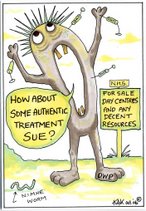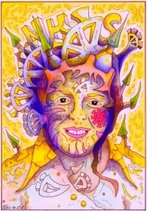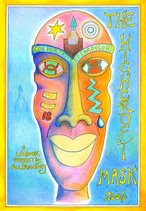.
Oh dear, no sooner some of the Improvement to Access for Psychological Therapies (IAPT) Cognitive Behaviour Therapy national roll out almost gets underway, er, here and there, but not via your GP Surgery according to a GP study, so it also gets hammered by strong implication by a study published in the
British Journal Of Psychiatry.
The study done by Professor Pim Cuijpers and others were trying to answer a question :
"It is not clear whether the effects of cognitive–behavioural therapy and other psychotherapies have been overestimated because of publication bias."
The study reviewed 117 trials against 175 comparisons and discovered a considerable overestimation of effectiveness of the therapies on depression .
Jeremy Laurence (Independent Health Editor) probed it well in his March 23rd report :
"Does Cognitive Behaviour Therapy Work And Should The NHS Provide More Of It For Depression"
He states :
"But how effective is it?We at UserWatch note the British Journal of Psychiatry abstract of the study did seem to use interchangeable terms : "cognitive behaviour therapy , psychotherapy , psychological therapies" rather too much because it is State prescribed CBT that has been very promoted over the last few years and appears to be taught very stricturedly behind the scenes and is under the spotlight . Never mind the study is free in one year's time after yer cogs have only been 18% oiled .....
Less so than its supporters think. Although approved by Nice, a review of 175 trials in the British Journal of Psychiatry published this month concluded that the effects had been exaggerated. Two-thirds of people (67 per cent) improved with therapy, which sounds impressive. However, 40 per cent improved without therapy. So the treatment delivered an extra 27 percentage-point "effect".
How has this been exaggerated?
By "publication bias". Publication bias occurs when publishers of medical journals choose to accept trials that show positive results and reject those that show zero or negative results. This skews the published literature to show a larger effect of the treatment than is true in reality. Pim Cuijpers from Vrije University, Amsterdam, who led the review, said that when publication bias is taken into account, it reduces the effect of CBT by "about one-third, to 18 per cent".
We thought some time ago that CBT will give useful deeper empathic therapies - genuinely trying to help people's damaged emotional lives, a really bad name by being lumped together as "psychotherapy" but then that's part of a bigger problem which might have been moving towards clearer resolution if patients had real choices and they as a genuine market drove quality over time .
We also note the social engineering tendency of the Guardian and BBC have hardly touched the efficacy of deeper therapy appropriate for people's life damages. And the need for greater supply of it to support people into better emotionally realistic navigation of themselves. What's wrong with hearing out people's pain , hurt, into witness ?
But then who needs cultures of depth of feeling and thought, other than those of the established status quo of State control and almost subtle social engineering colonial leanings ?
Try asking the 500 Afro Caribbeans who were wrongly diagnosed with onset psychosis and whose backgrounds of parental poor attachments and cultures of instability created their pain and behavior .. Strange isn't it how a large study with 500 Afro Caribbeans gets buried because basically it blows the myth of bio-medical standpoints into the winds of the social streets and their felt and experienced effects .. Yeahhhh lets ignore depth .... Its dangerous for class interests..
Mind you the Guardian did report the study, that's something ...
Dec 9th 2009 Guardian
"The worrying figures emerged from a large study carried out by psychiatrists and epidemiologists at the social psychiatry unit of the Institute of Psychiatry at the Maudsley hospital in south London. Named Aesop (Aetiology and Ethnicity in Schizophrenia and other Psychoses), the study involved 500 patients with mental health problems from various ethnic groups, comparing them with a control group of 350 healthy subjects.
The researchers ruled out genetic issues as the cause, and the previously held suspicions that psychiatrists were more inclined to diagnose schizophrenia when dealing with black males in particular. They concluded instead that the root causes lay in a whole range of social factors that lead to severe social isolation – people living alone, unemployment, and the vexed issue of separation from parents due to family breakdowns in the African Caribbean community amounting to a kind of "sensory deprivation" "
.


.jpg)







2 comments:
I am not a number. Don't care what they say Ha! Ha!
Did you know that 99% of cats whose owners have mental illness, can't tell the difference between them and the 'sanees'. Actually, that could be utter tripe because nobody has sussed kitty lingo enough yet to get them to fill in the survey forms.
Best head off before the coglomites try and remind me how mindfull I need to be. I do look both ways before I cross the road ...that will do for me :>)
They do say the charity MIND is so "mindful" that its CBT provisioning existence is always on its MIND ..
At Userwatch we might have a KIND-ful campaign where people are treated with care and empathy and slices of cake now and then and where Patient Choice drives who you choose to be KINDful to you - But will it catch on ?
Cog Knows ..
PG for UW Team
Post a Comment